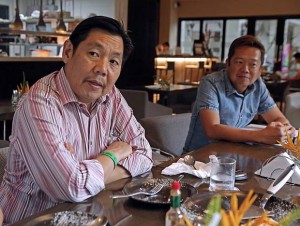
Robert Go, Philippine Retailers Association (PRA) Cebu chapter president, and Pablo Yap, PRA Cebu chapter past president, discuss ways to improve local retailers chances in the upcoming Asean integration.
(CDN PHOTO/LITO TECSON)
Innovate and use technology to increase competitiveness or risk getting left behind.
Two officials of the Philippine Retailers Association Cebu chapter gave this advice to local players to help them to become competitive and to maximize the opportunities that will come with the Asean economic integration.
Robert Go, PRA Cebu chapter president, said he always believes that new technologies have all the answers to every retailer’s operational concern.
In his stores for example, Go said that they have bought computer softwares that help them decide more efficiently and avoid waste of resources.
Go is the president of the Prince Retail Group that operates retail shops that cater to sari-sari stores.
He said they have softwares that allow them to keep track of stocks, buying patterns of the customers in specific areas so that they will know what products to stock up in specific stores.
Go said there are many operational issues that can simply be addressed by technology.
“We have a lot of softwares available now and people who are capable of coding programs,” said Go.
These available technologies, however, needs to be complemented with a faster, stable and more reliable Internet, said Jun Yap, PRA Cebu chapter chairman.
“In terms of technology, we’re supposed to be advanced, but look at our Internet services, it’s very slow and very expensive,” said Yap.
Other neighbors in the region including Japan, China, Singapore and Hong Kong all have LTE Internet, which translates to positive and robust economic growth.
Go and Yap said that they have organized monthly seminars for retailers to better prepare them of the coming Asean integration.
Early this month PRA Cebu organized a seminar on modern approaches to increase store profitability.
Go said about 300 retailers attended the seminar.
“We saw that many are actually interested to learn so we will be organizing more of these seminars and bring in international experts to talk and give useful tips to the retailers,” he said.
Go said there are currently 120 members of the organization and they plan to increase the membership especially from the small and medium players.
“I think to be able to compete, we need to bond and help each other. We will be clustering the members according to sectors and industries so that we can help address specific issues common to the industries,” said Go.
Go said he believes that businesses should be able to do three things — be sophisticated with their products that customers cannot resist it, they must have proper visual merchandising to attract clients and last is they must invest in technology.
“Technology is very important for me. Nowadays, people are very specific with what they want and with technology you can have more informed decisions and achieve efficiency in your business,” said Go.
GOV’T SUPPORT
Yap, however, said that while the private sector is doing its best to remain competitive, they will also need intervention from the government.
“There is a lot that government can do that the private sector can’t, like the issue on slow connectivity. The government can set a standard for the telcos to comply like at least all connections should now be at least 3G,” said Yap.